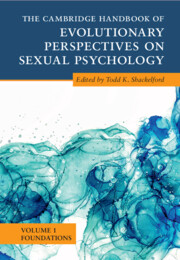Book contents
- The Cambridge Handbook of Evolutionary Perspectives on Sexual Psychology
- The Cambridge Handbook of Evolutionary Perspectives on Sexual Psychology
- Copyright page
- Contents
- Contributors
- Preface
- Part I Foundations of Evolution
- Part II Middle-Level Theories
- 7 Parental Investment Theory
- 8 Parent–Offspring Conflict
- 9 Theory and Evidence for Reciprocal Altruism
- 10 Life History Theory and Mating Strategies
- 11 Sperm Competition Theory
- 12 Sexual Conflict Theory
- 13 Cross-Species Comparisons
- 14 Cross-Cultural Methods in Sexual Psychology
- 15 Behavioral Genetics
- 16 Sex Differences and Sex Similarities
- 17 Individual Differences in Sexual Psychology
- 18 Experimental Methods in Sexual Psychology
- Index
- References
13 - Cross-Species Comparisons
from Part II - Middle-Level Theories
Published online by Cambridge University Press: 30 June 2022
- The Cambridge Handbook of Evolutionary Perspectives on Sexual Psychology
- The Cambridge Handbook of Evolutionary Perspectives on Sexual Psychology
- Copyright page
- Contents
- Contributors
- Preface
- Part I Foundations of Evolution
- Part II Middle-Level Theories
- 7 Parental Investment Theory
- 8 Parent–Offspring Conflict
- 9 Theory and Evidence for Reciprocal Altruism
- 10 Life History Theory and Mating Strategies
- 11 Sperm Competition Theory
- 12 Sexual Conflict Theory
- 13 Cross-Species Comparisons
- 14 Cross-Cultural Methods in Sexual Psychology
- 15 Behavioral Genetics
- 16 Sex Differences and Sex Similarities
- 17 Individual Differences in Sexual Psychology
- 18 Experimental Methods in Sexual Psychology
- Index
- References
Summary
Comparisons across species have long been used to explore biological, medical, social, and behavioral phenomena. Throughout the twentieth century, behavioral psychologists and ethologists approached the problem of cross-species comparisons from different perspectives: Behaviorists focused on tightly controlled sterile laboratory experiments that mostly used a select few species, whereas ethologists utilized a more naturalistic approach to observe a diverse set of animals in their natural habitats. The behaviorist approach allowed for a systematic exploration of the processes unique to and common across species, whereas the ethologist approach highlighted how ecological pressures shape cognitive capacity. In this chapter, we explore how the convergence of these two approaches can be used to explore the evolution of cognition using organisms’ capacity for learning (behavior adaptation due to experience) as a framework. For this purpose, we review the existing literature on the relatively simple nonassociative phenomenon of stimulus habituation, which has been observed in a wide range of animals, ranging from unicellular organisms to complex vertebrates, with only quantitative differences in the extent to which the phenomenon is observed across species. The common characteristics of habituation across species, and its potential role in defensive survival mechanisms and mate selection, suggest that some basic phenomena have been conserved through evolution. We also review the occurrence of associative learning across species, and how the capacity to make predictions about their environment can serve to increase survival and reproductive success. The emergence of associative learning has been suggested as a critical step in cognitive development that was a cause or consequence of the diversification of species that occurred during the Cambrian period. The capacity for associative learning also seems to be shaped by ecological pressures, such that certain associations are more easily learned than others. That is, associations are not genetically encoded, but each species’ evolutionary history leads to some associations being preferentially acquired over others. Associative learning also appears to exhibit qualitative differences across species, with some species appearing to lack a capacity to exhibit certain associative phenomena. However, the failure to observe a phenomenon should be used carefully when drawing conclusions about a given species’ cognitive capacities because a failure to accomplish a task may reflect instead physical limitations to successfully completing the task. Different species’ biological adaptations mean that widely different methodologies may be needed to uncover phenomena that could serve each species in their respective ecological niches. These methodological issues may limit the extent to which species can be directly compared. Finally, the capacity for learning may not be limited to animals, as a handful of studies have suggested that plants can exhibit learning-like capabilities. We conclude that cross-species comparisons are an essential tool to understand the phylogeny of cognition.
- Type
- Chapter
- Information
- Publisher: Cambridge University PressPrint publication year: 2022

